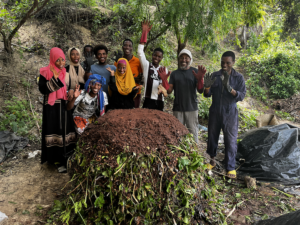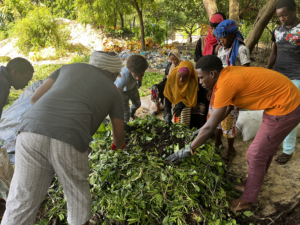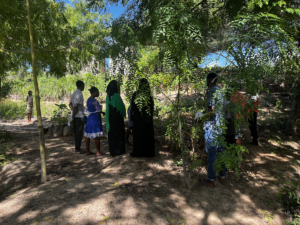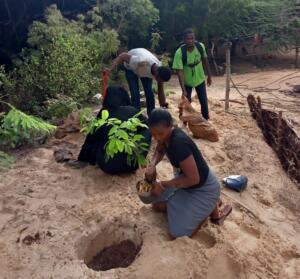Practical Permaculture Design Course Specifically for Lamu Island – Final Report
In May and June 2022 Earth Love executed two practical permaculture design courses (PPDC) for 17 individuals recruited from across Lamu Island. Due to the unique Lamu environment, the course was designed specifically for the Island to ensure maximum positive results for those taking part.
Of the 17 participants, 6 were women ensuring that both genders were represented throughout the project and 2 were Earth Love staff so didn’t receive the scholarship funding.
The course was a combination of theoretical lessons in an open classroom style and practical classes at the neighbouring regeneration site and demonstration farm of Earth Love. Participants also had the opportunity to visit sites outside of the farm including Shamba Miti Mingi (Many Trees Farm) a regenerative farm in the heart of Lamu Island, Natural Lamu Shamba a natural farm that lies between Shela and Lamu growing trees and plants that provide exceptional benefits in health and cosmetics, and The Flipflopi Project recycling site in Wiyoni.

The Project Desired Outcomes:
- Increase food security on Lamu Island.
- Address water shortages and drought by encouraging more sustainable use of the limited resource.
- Diversify income through introducing farming activities, including beekeeping and nursery establishment.
- Mitigate climate change through regreening the land with drought-resistant plant cover.
- Encourage the strategic use of biochar for CO2 capture and sequestration.
- Improve soil to sequester more carbon.
- Provide access to natural and traditional food, herbs and medicine to support local communities.
- Improve sustainable waste management through encouraging composting and better sorting of waste.

Feedback on the Desired Outcomes:
- Participants were educated about the many varieties of nutritious food beyond the usual maize, beans, spinach and limited fruit trees that can thrive in the Lamu soil.
- Water management techniques such as mulching, planting of pioneer trees to provide shade and windbreaks and the reuse of wastewater from the household were taught to encourage sustainable water use. These were all new methods to the participants and techniques that can be easily implemented in their shambas. Earth Love demonstrated how they reversed desertification through planting locally adapted vegetation, and how they aim to increase rainfall through tree planting to attract. It was hoped that participants could be inspired to do the same in their communities.
- Some of the participants are eager to engage their newly learned skills in the diversification of income through farming activities, including beekeeping and nursery establishment, since they now have the tools needed.
- The importance of drought-resistant plant cover to mitigate climate change was demonstrated on the Earth Love farm. Participants were taught that a resilient and biodiverse permaculture system of growing food is vital to mitigate changes in the pattern of rainfall. During the training, participants saw the difference between the Earth Love farm and traditional island shambas.
- The use of biochar was a new concept for all the participants and especially challenging due to cultural and religious reasons. Unfortunately, due to these challenges the objective to introduce biochar was not achieved. However, an alternative method called compost tea using Titonia was introduced that participants were happy to use.
- Participants learnt how to make compost to improve their soil and have been inspired to plant a greater variety of trees and other plants that will further improve the soil.
- Participants were taught the natural properties of plants that are able to grow locally which inspired many to plant these same plants.
- Through practical training and the visit to the Flipflopi site, sustainable waste management was taught by avoiding waste, composting kitchen waste, sorting plastic, metal and other waste to take them to recycling partners, reusing grey water in the garden and the use of compost toilets were part of the course practical’s and site visits. Most of these strategies were embraced, however, the compost toilets were due to cultural or religious reasons.

Participant Feedback
From the first course;
- 2 participants are interested in implementing permaculture practices in their workplace shambas.
- 3 participants from Kipungani have their own shambas and are busy planting and intercropping with trees in a syntropic agroforestry style.
- One of the participants doesn’t have access to their own shamba but works for a youth enterprise and benefited from the community currency and income generation teachings in the curriculum.
- Another from Shela will start a home garden where he rents but aims to implement something bigger in his native village on the mainland.
From the second course;
- The neighbour of Earth Love in Shela has already started planting the seeds he was given in the course.
- A participant from Matondoni will be implementing her knowledge on her family land.
- One of the participants works at Shamba Miti Mingi where there is a large amount of land to build a fruit forest on together with his other team members.
- A participant from Manda is busy planting and very grateful for the generous rains.
- One participant came from a Church group in Lamu and plans to implement something at his church’s compound.
- One participant’s family shamba is quite a distance away and she is not yet sure how to implement the gained skills and knowledge on the ground.
- Another participant doesn’t have their own land but is very active in the Lamu Women’s Alliance where the organization does regular community sensitization and environmental training so she can share her knowledge.
- The member from Mararani village is already very much engaged with environmental matters and has planted a garden already.
- The two other students from Earth Love’s shamba team are working daily to keep our trees alive, plant more biodiversity, and regenerate land and soil as they implement waste management on our site.

Next Steps
Each course created a group chat to share feedback, recommendations, pictures and videos and to keep in touch. The groups are used to check on the implementation progress of the learned design principles and further motivate the trainees to have a competition for the most successful implementation of permaculture techniques at home – this is the final phase of the project to ensure the techniques learnt are put into practice.
Earth Love and their partner organisation Collective Sovereignty are implementing a tree planting project soon where participants have been invited to share their knowledge.
Earth Love has been approached by other farms to recommend trainees’ further employment. From this, one participant has been hired by Natural Lamu and another by Earth Love.
Earth Love would like to sponsor more local people from beyond Lamu Island to be beneficiaries of PPDC scholarships. In the next course, they would like to hold a course for participants from Manda and Pate. The participants of the two courses agreed that it would be beneficial for more people to undertake this training.
